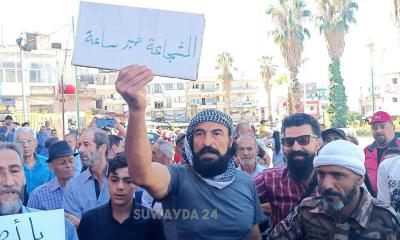Since the peaceful protests began nearly a year ago in Syria's Al-Suwayda, Merhej Al-Jurmani has been a constant presence in the designated gathering area for protesters known as "Al-Karamah." He consistently voiced the demands of the people for the fall of the Syrian regime, the departure of its president, and the implementation of international resolutions regarding a solution in the country. At times, he addressed the crowds, urging them to continue their fight against the regime; in other instances, captured in videos, he appeared bare-chested, chanting anti-Baath Party slogans and challenging the gunfire aimed at demonstrators by the regime’s forces in the province.
Despite being the leader of a faction known as "Liwa Al-Jabal," the militarization surrounding his persona did not deter his peaceful conduct in "Al-Karamah," which he reaffirmed just a day prior to his assassination by a "silent" bullet on Wednesday night. According to news networks and forensic reports, the bullet came from a silenced weapon, fired from a distance of two to three meters, before it struck Al-Jurmani while he was asleep in his home.
While the perpetrator of the assassination remains unknown, activists and journalists from Al-Suwayda have blamed the Syrian government for this act.
### Who is Merhej Al-Jurmani?
The assassination of the local faction leader in Al-Suwayda on Wednesday morning has shocked the province. Preliminary investigations indicate the act was carried out by unidentified individuals within his home using a silenced weapon. Al-Suwayda has been reeling from the news of Al-Jurmani's assassination, regarded as the most shocking incident since 2015, when Sheikh Wahid Al-Bal'ous, a religious leader and opponent within the Druze community, was killed by a car bomb.
The "Men of Al-Karamah" movement, the largest local faction in Al-Suwayda, issued a statement on Facebook mourning Al-Jurmani, announcing he would be buried the following Thursday in the village of Um Al-Zaytoun. The statement expressed condolences to his family and described Al-Jurmani as having been treacherously martyred at the hands of "the bats of darkness," characterizing the assassination as a "critical turning point for Al-Suwayda." The movement accused those behind the assassination of trying to drag Al-Suwayda into a "quagmire of blood and cycle of violence," calling for unity among all dignified individuals and diverse groups in the region to fulfill their responsibilities.
### A History of Struggle
Since the outbreak of peaceful protests in the predominantly Druze province, Al-Jurmani adopted a neutral stance, refraining from issuing any negative or positive comments regarding the slogans and chants directed against the regime. In his leadership role during the peaceful protests in Al-Suwayda, Al-Jurmani previously led an armed local faction known as "Liwa Al-Jabal." This faction participated in confronting extremist groups that attacked Al-Suwayda multiple times after 2014, as well as engaged in clashes against regime-supported groups, as noted by Rayan Ma’roof, director of the "Al-Suwayda 24" network. He mentions that Al-Jurmani's primary adversary, according to those close to him, was the security regime, which had waged a campaign of incitement against him and sought to tarnish his reputation in recent months.
Two days prior to the assassination, security forces and police had fired shots into the air to intimidate demonstrators, injuring a bystander. It is believed that Al-Jurmani's discovery of a security-related network spreading confusion and tarnishing the image of local families accelerated the execution of the assassination.
### "More Than Just the Assassination of a Figure"
Despite the ongoing protests in "Al-Karamah," the regime has not responded to any demands. On the morning of the assassination, protesters carried images of Al-Jurmani and condemned his killing. A video was recorded of a Druze cleric named Sheikh Rizq attacking the Syrian regime, holding it responsible for the death of "Liwa Al-Jabal's" leader. Speaking to a crowd in "Al-Karamah," Rizq stated, "This is the regime’s method... the regime only possesses means of militarization, schemes, and intrigues. It speaks the language of killing, displacement, and the elimination of others."
He added, "Our message from Al-Karamah to the damned regime: you will not be able to drag us into your arena and strip us of our peacefulness. We will triumph with olive branches and bouquets of flowers."
Researcher and journalist Mazin Azzy shared a post on Facebook, opening with a statement from Sheikh Hikmat Al-Hajri, an early supporter of the peaceful movement, who remarked at the start of the protests: "At night, we close our doors and go to sleep, but evil doesn’t rest." Azzy continued, "Evil assassinated today Merhej Al-Jurmani, the leader of Liwa Al-Jabal, in his bed. Evil is cowardly. Evil is trying to infiltrate Al-Suwayda through its security and media tools and will succeed in many areas, killing, distorting, attacking, and assassinating, and sowing discord among the people."
The writer and journalist also pointed out a "plan for evil to instigate a civil war in the province." He called on the people of Al-Suwayda, urging them to recognize that "this is a battle of destiny and existence for them as a community and as human beings. They must protect themselves, govern themselves, learn how to manage their differences, reach common solutions, and rid themselves of this decaying regime."
Al-Suwayda is one of the Syrian provinces under government control and has previously witnessed peaceful demonstrations against Assad, although it had not reached its current state. It remains uncertain where this popular movement will lead, particularly given the lack of any significant response or engagement from the regime, whether positive or negative. The peaceful movement has continued to receive support from Sheikh Al-Hajri and Sheikh Abu Wael Al-Hanawi in recent months, involving both young people and a wide range of women and community segments, including farmers, employees, teachers, and others.




